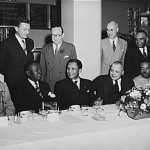Confessions of a 3L, Installment Three: What do Brussel Sprouts and Moot Court Have in Common?
Now, can I think of other ways I would like to spend my Sunday than having three consecutive hour-long practices of my moot court argument? Yes. Yes, I can.
Can I think of anything that has been more valuable to my legal education besides moot court? Barring internships and jobs where I have actually been working in the field (see Installment Two), no. No, I can’t.
Last semester, I had the pleasure and privilege of serving as the ASP leader for the Appellate Writing and Advocacy classes, which serve as the prerequisite for Marquette’s growing Moot Court program. As an icebreaker the first time I met the classes, I made reference to a presentation I am writing for 1L students who are interested in getting involved in Moot Court. It was entitled “WHY IN THE WORLD WOULD I WRITE A BRIEF IN MY SECOND YEAR OF LAW SCHOOL IF I DON’T HAVE TO?” The hilarity I anticipated did not ensue. I could see tiny thought bubbles popping up above the students’ heads. They read: “Ah, yeah. Wait. Why am I doing this?”



